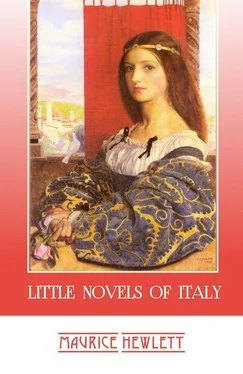Maurice Hewlett - Little Novels of Italy
Здесь есть возможность читать онлайн «Maurice Hewlett - Little Novels of Italy» весь текст электронной книги совершенно бесплатно (целиком полную версию без сокращений). В некоторых случаях можно слушать аудио, скачать через торрент в формате fb2 и присутствует краткое содержание. Город: New York ; London, Год выпуска: 1899, Издательство: The Macmillan Company : Macmillan & Co., Ltd., Жанр: Историческая проза, на английском языке. Описание произведения, (предисловие) а так же отзывы посетителей доступны на портале библиотеки ЛибКат.
- Название:Little Novels of Italy
- Автор:
- Издательство:The Macmillan Company : Macmillan & Co., Ltd.
- Жанр:
- Год:1899
- Город:New York ; London
- ISBN:нет данных
- Рейтинг книги:4 / 5. Голосов: 1
-
Избранное:Добавить в избранное
- Отзывы:
-
Ваша оценка:
- 80
- 1
- 2
- 3
- 4
- 5
Little Novels of Italy: краткое содержание, описание и аннотация
Предлагаем к чтению аннотацию, описание, краткое содержание или предисловие (зависит от того, что написал сам автор книги «Little Novels of Italy»). Если вы не нашли необходимую информацию о книге — напишите в комментариях, мы постараемся отыскать её.
(1899), a collection of brilliant short stories, English historical novelist, poet and essayist, Maurice Hewlett showed again his power of literary expression together with a close knowledge of medieval Italy.
На обложке: акварель «Молли, герцогиня Ноны» (Molly, Duchess of Nona, 1905) английского художника Фрэнка Кадогана Коупера (Frank Cadogan Cowper).
Little Novels of Italy — читать онлайн бесплатно полную книгу (весь текст) целиком
Ниже представлен текст книги, разбитый по страницам. Система сохранения места последней прочитанной страницы, позволяет с удобством читать онлайн бесплатно книгу «Little Novels of Italy», без необходимости каждый раз заново искать на чём Вы остановились. Поставьте закладку, и сможете в любой момент перейти на страницу, на которой закончили чтение.
Интервал:
Закладка:
"Giovanottin, che te ne vai di fuora,
Stattene allegro, e così vo' far io.
Se ti trovassi qualche dama nuova,
L'ha da saper che tua dama son io."
So sang she, innocently enough, whose sweethearting went no farther than her artless lips. There was not a spice of mischief in the girl. What she had told La Testolina had been no more than the truth: Master Baldassare was good to her—better than you would have believed possible in such a crabbed old stub of a man. He was more of a father to her than ever Don Urbano had been to anything save his own belly; but it was incontestable that he was not father to anything else. That alone might have been a grievance for Vanna, but there is no evidence that it was. Baldassare was by nature gruff, by habit close-fisted: like all such men, the more he felt the deeper he hoarded the thought under his ribs. The most he would venture would be a hand on her hair and a grunt when she did well; so sure as she looked up gratefully at him the old man drew off, with puckered brows and jaws working together. He may have been ashamed of his weakness; it is dead certain that no one in Verona, least of all Vanna herself, suspected him of any affection for his young wife. Mostly he was silent; thus she became silent too whenever he was in the house. This was against nature, for by ordinary her little songs bubbled from her like a bird's. But to see him so glum and staring within doors awed her: she set a finger to her lips as she felt the tune on her tongue, and went about her business mute. Baldassare would go abroad, stooping under his pack: she took her seat at the shop-door, threaded her needle, her fingers flew and her fancy with them. The spring of her music was touched, and all the neighbours grew to listen for the gentle cadences she made.
So passed a year, so two years passed. Vanna was twenty-three, looking less, when along there came one morning a tall young friar, a Carmelite, by name Fra Battista, with a pair of brown dove's eyes in his smooth face. These he lifted towards Vanna's with an air so timid and so penetrating, so delicate and hardy at once, that when he was gone it was to leave her with the falter of a verse in her mouth, two hot cheeks, and a quicker heart.
This Fra Battista, by birth a Bergamask, accredited to the convent at Verona by reason of his parts as a preacher, was tall and shapely, like a spoilt pretty boy to look at, leggy, and soft in the palm. His frock set off this petted appearance—it gave you the idea of a pinafore on him. He did not look manly, was not manly by any means, and yet not so girlish but that you could doubt his sex. His eyes, which, as I say, were soft as a dove's pair, he was not fond of showing; and this gave them the more searching appeal when he did. His mouth, full and fleshy in the lips, had a lovely curve. He kept it very demure, and, when he spoke, spoke softly. This was a young man born to be Lancilotto to some Ginevra or other; and, to do him justice, he had had his share of adventure in that sort at an early age. He had learned more out of Ovid than from the Fathers of Divinity, you may believe. Very popular he was in whatsoever convent he harboured, as a preacher famous all over Lombardy and the March,—in Bergamo, in Brescia, even as far as Mantua he had been heard of. The superior at Verona did his best to spoil him by endearment, flattery, and indulgence; but this was difficult, since he had been spoilt already.
He passed down the Via Stella morning and evening for a week. Morning and evening his eyes encountered Vanna's. The third evening he smiled at her, the fourth morning he saluted her; the fifth evening he stopped and slipped in a gentle word; the first evening of the second week he stopped again, and that night, La Testolina being by, there was quite a little conversation.
La Testolina had black eyes, a trim figure, and a way of wriggling which showed these to advantage. Fra Battista's fame and the possibility of mischief set her flashing; she led the talk and found him apt: it was not difficult to aim every word that it should go through and leave a dart in Vanna's timid breast. The girl was so artless, you could see her quiver, or feel her, at every shot. For instance, was his sanctity very much fatigued by yesterday's sermon? Eh, la bella predica! What invocations of the saints, what heart-groping, what reachings after the better parts of women! It was some comfort to know that a woman had a better part at all—by the Saviour! for their handling by men gave no hint of it. Let Fra Beato—ah, pardon, Fra Battista she should have said—send some such arrows into men's hides! See them, for the gross-feeding, surly, spend-all, take-all knaves that they were! One or two she might name if she had a mind—ah! one or two in this very city of Verona, in this very Street of the Star, who—But there! Vanna must go and hear the Frate's next sermon, she must indeed. And if she could take her old curm— Pshutt! What was she saying? How she ran on! She did indeed. Fra Battista, leaning against the lintel, kept his eyelids on the droop, seemed to find his toes of interest. But now and again he would look delicately up, and so sure as he did the brown eyes and the grey seemed to swim towards each other, to melt in a point, swirl in an eddy of the feelings, in which Vanna found herself drowning and found such death sweet. La Testolina still ran on, but now in a monologue. Fra Battista looked and longed, and Vanna looked again and thrilled. It grew quite dark; nothing of each other could they see and little know, until the friar put out his foot and found Vanna's. A tremor, beginning at her heart, ran down to her toes; Battista felt the flutter of it and was assured.
When he left her that night he kissed her cold hand, then La Testolina's, which he found by no means cold, and moved off leisurely towards the Piazza dell' Erbe. Neither woman spoke for a while: La Testolina was picking at her apron, Vanna sat quietly in the dark holding her heart. She was still in a tremble, so ridiculously moved that when her friend kissed her she burst out crying. La Testolina went nodding away; and the end of the episode may be predicted. Not at one but at many sermons of the tall Carmelite did Vanna sit rapt; not for one but for every dusk did he stoop to kiss her hand. All Verona saw her devotion,—all Verona, that is, but one old Veronese. The essence of comedy being that the spectators shall chuckle at actors in a fog, here was a comedy indeed.
III
THE SEED OF DISCORD
When Vanna announced her condition the neighbours looked slyly at each other; when her condition announced Vanna, they chattered; the gossip sank to whispering behind the hand as time went on, and ceased altogether when the baby was born. That was a signal for heads to shake. Some pitied the father, many defended the mother: it did not depend upon your sex; sides were taken freely and voices were shrill when neither was by. Down by the river especially, upon that bleached board below the bridge, ci and si whistled like the wind in the chimneys, and the hands of testimony were as the aspen leaves when storms are in. Some took one side, some another; but when, in due season, it was seen what inordinate pride Baldassare had in the black-eyed bambino there was no question of sides. He had ranked himself with the unforgivable party: the old man was an old fool, a gull whose power of swallow stirred disgust. Vanna had the rights of it, they said; such men were made to be tricked. As for Fra Battista's pulpit, it was thronged about with upturned faces; for those who had not been before went now to judge what they would have done under the circumstances. Having been, there were no two opinions about that. Messer Gabriele Arcangelo, some said, judging by the honey-tongue; San Bastiano, others considered him, who went by his comely proportions; and these gained the day, since his beardless face and friar's frock induced the idea of innocence, which Sebastian's virgin bloom also taught. The quality of his sermons did not grow threadbare under this adventitious criticism: he kept a serene front, lost no authority, nor failed of any unction. There was always a file at his confessional; and at Corpus Christi, when in the pageant he actually figured as Sebastian, his plump round limbs roped to a pine-stock drew tears from all eyes.
Читать дальшеИнтервал:
Закладка:
Похожие книги на «Little Novels of Italy»
Представляем Вашему вниманию похожие книги на «Little Novels of Italy» списком для выбора. Мы отобрали схожую по названию и смыслу литературу в надежде предоставить читателям больше вариантов отыскать новые, интересные, ещё непрочитанные произведения.
Обсуждение, отзывы о книге «Little Novels of Italy» и просто собственные мнения читателей. Оставьте ваши комментарии, напишите, что Вы думаете о произведении, его смысле или главных героях. Укажите что конкретно понравилось, а что нет, и почему Вы так считаете.











